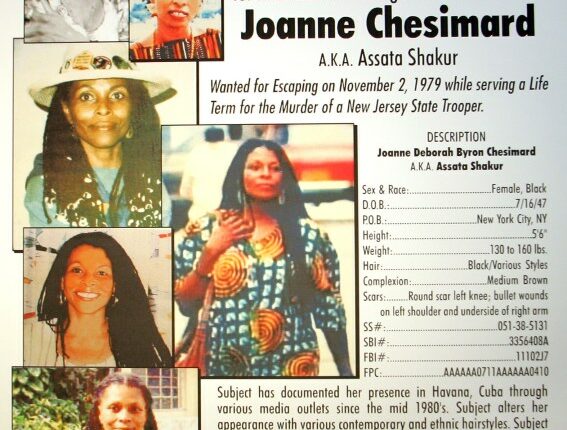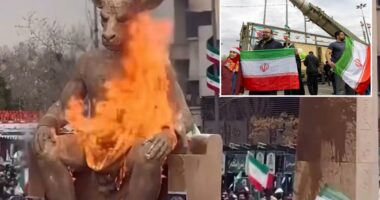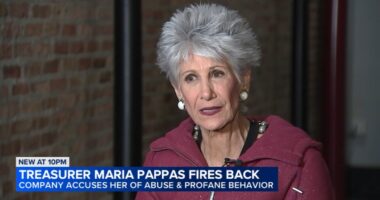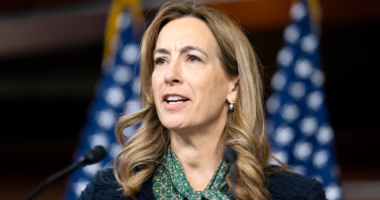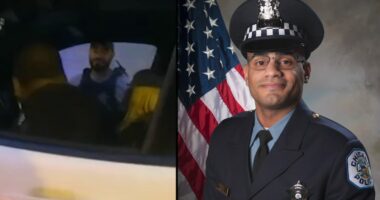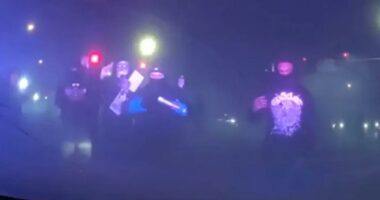Share this @internewscast.com

Assata Shakur, a prominent Black liberation activist who was granted political asylum in Cuba following her 1979 escape from a U.S. prison where she was serving a life sentence for the murder of a police officer, has passed away, according to her daughter and the Cuban government.
Previously known as Joanne Deborah Chesimard before adopting the name Assata Shakur, she died on Thursday in Havana due to “health conditions and advanced age,” according to a statement from Cuba’s Ministry of Foreign Affairs. Her daughter, Kakuya Shakur, confirmed her passing via a Facebook post.
Officials in New Jersey, where Shakur had been arrested, convicted and imprisoned, said she was 78.
As part of the Black Panther Party and the Black Liberation Army, Shakur’s situation became a symbol of the tense relations between the United States and Cuba. U.S. authorities, including President Donald Trump during his first term, persistently called for her extradition from the communist country for many years.
The FBI listed Shakur among the “most wanted terrorists,” yet she, along with her supporters, argued that she was unfairly targeted for crimes she did not commit or believed were justified.
On May 2, 1973, Shakur and two others were pulled over by New Jersey State Police troopers because the car they were driving had a broken taillight.
A gunfight ensued and one of the troopers, Werner Foerster, was killed and another was wounded. One of Shakur’s companions was also killed.
Originally from New York City, Shakur was captured after fleeing and was found guilty of murder, armed robbery, and other charges in 1977, earning a life sentence. She faced further accusations of bank robberies and involvement in the non-fatal shootings of two other police officers, but most were either dropped or ended in her acquittal.
However, Shakur’s time in prison was brief. In November 1979, members of the Black Liberation Army disguised as visitors entered the Clinton Correctional Facility for women, held two guards hostage, and used a prison van to facilitate her escape.
Shakur disappeared before eventually emerging in 1984 in Cuba, where Fidel Castro granted her asylum.
Offering Shakur safe harbor was one of the most famous examples of Cuba aligning itself with what it describes as revolutionary forces struggling against the oppressive capitalist empire to the north.
Much like Cuba supported anti-colonial and left-wing forces in Africa, Central and South America, the Cuban government saw the armed Black liberation movement in the U.S. as part of a global revolutionary struggle.
New Jersey officials decry her asylum
New Jersey State Assemblyman Michael Inganamort, who sponsored a resolution last year calling on Cuba to extradite Shakur, lamented Friday that “justice was never served” in Foerster’s death, while the labor union representing New Jersey officers dismissed Shakur “for her crime and cowardice.”
New Jersey Gov. Phil Murphy and State Police Superintendent Patrick Callahan said they would “vigorously oppose” any attempt to repatriate Shakur’s remains to the U.S.
“Sadly, it appears she has passed without being held fully accountable for her heinous crimes,” they said in a joint statement. “Unlike his killer, Trooper Foerster never had a chance to live out his days in peace.”
Sundiata Acoli, who was also convicted in Foerster’s killing, was granted parole in 2022.
In her writings over the years, Shakur has maintained she didn’t shoot anyone and had her hands in the air when she was wounded during the gunfire.
Shakur’s writings became a rallying cry
More recently, her writings became a rallying cry during the Black Lives Matter movement, though opponents criticized her words as being influenced by Marxist and communist ideology.
“It is our duty to fight for our freedom. It is our duty to win,” Shakur wrote in “Assata: An Autobiography,” originally published in 1988. “We must love each other and support each other. We have nothing to lose but our chains.”
Black Lives Matter Grassroots Inc., a collective of racial justice activists from around the U.S., vowed to “fight in her honor and memory.”
Malkia Amala Cyril, an early organizer of the BLM movement, expressed sorrow because Shakur died during a time of rising authoritarianism.
“The world in this era needs the kind of courage and radical love she practiced if we are going to survive it,” said Cyril, whose late mother had been part of the Black Panthers in New York alongside Shakur.
Shakur’s influence extended into the music world. She was famously close to the family of late rapper Tupac Shakur, who had considered her a godmother.
Public Enemy, the political hip-hop group and Rock and Roll Hall of Fame inductees, are thought to be the first major artists to reference Shakur. The 1988 song “Rebel Without a Pause,” from the album It Takes A Nation, includes the lyrics “supporter of Chesimard,” referring to her legal name.
Rapper Common told Shakur’s story in his 2000 song “A Song for Assata.” The Grammy award-winner’s invitation to a White House poetry event in 2011, during the Obama administration, drew outrage from conservatives and law enforcement groups who felt it was disrespectful to Foerster’s family and police officers broadly.
___
Associated Press writers Aaron Morrison and Michael Weissenstein in New York contributed to this story.
___
This story has been corrected to reflect that Joanne Deborah Chesimard was Shakur’s married name, not her birth name. It has also been corrected to reflect that she was charged with attempted murder, not murder in the shootings of two other police officers.
___
Follow Philip Marcelo at
